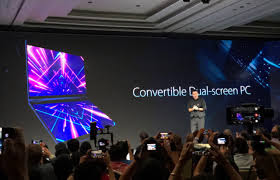At Computex in Taipei, Asus surprises by unveiling a prototype of a portable, dual-screen touch-sensitive laptop computer, sprinkled with artificial intelligence, Project Precog.
Jealously guarded in Asus development labs, the "One More Thing of Asus" has aroused our curiosity. His name is Project Precog. Behind this name hides an elegant convertible laptop, equipped with two 13.3-inch touch screens, the first is in its normal place and the second, replaces the keyboard.
More than just another convertible, the Precog would be a PC endowed with artificial intelligence, able to anticipate or adapt to the need of its user. Skeptical? The spokespersons of the brand are formal: no question of presenting a "VaporWare here", the Project Precog will see the day well in the next year. Maybe not in this form though.
From the hardware configuration, we will not learn anything, unfortunately it is still too early to detail. However, Asus has put the machine on the stage to give us an overview of the possibilities of use offered.
In addition to the usual four uses of a convertible, Asus adds a fifth: place the machine as an open book in front of, connect a wireless keyboard and, for example, code on the left screen and see the result on the right page, while watching a movie, without the need for an external screen.
A PC driven to be intelligent ... or very observant?
Alert: for the future, it will take a little imagination because Asus has evoked several scenarios among which are plausible and others, hardly conceivable for the time for lack of technical explanations.
Asus first evokes the presence of a reloading system and therefore intelligent consumption of the PC. So, according to Jerry Chen (CEO of Asus), invited to the Intel conference taking place the same day, depending on the time of day or the kind of applications run on the Project Precog, the platform would be able to trigger reload process or adapt its energy needs, based on the use of its owner. No doubt Asus has planned to use a little deep learning to achieve this little feat.
Another evidence of intelligence put forward, the identification of the needs of the user in real time. With Intel's Movidius VPU chip, Precog could display a virtual keyboard on the second screen, capturing the movement or position of the user's hands in real time.
Asus also evokes the presence of a smart camera capable, among other things, to recognize the face of the user or to analyze his posture or objects to trigger certain actions ... not detailed.
Intelligence always, if several windows are open, the keyboard could occupy only part of the second screen, leaving a window in full screen, the other on the first half of the second slab and then came the keyboard.
Better yet, when using Excel for example, Precog might be able to offer both an intelligent display of windows but also to display on the second screen tools or more relevant layout options .
Finally, you can not talk about AI without mentioning Microsoft, Asus partner. Cortana would of course be present in Precog but the personal assistant of Microsoft will have to tighten a little to leave a small place to Alexa of Amazon, also present under the keyboard. Logic since Microsoft has established a partnership with the distribution giant for the two assistants to collaborate on our machines.
Thus, launching apps to the voice even if one is a little far from the keyboard will be possible. Nothing really innovative here since Alexa (and of course Cortana) is already present in some laptops for several months.
Asus shows here that it still wants and the will to innovate and can count on the help of Intel and Microsoft to manage to make Precog come into being. The two giants are betting big on the artificial intelligence and, as such, Intel announced at Computex its willingness to provide developers with its SDK relating to AI (Intel AI Developer for PC Program) so that other manufacturers imagine "smart computers".
